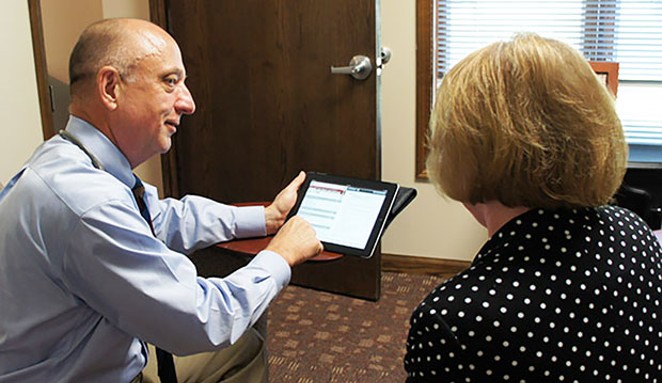
Health screenings are medical tests that doctors use to check for diseases and health conditions before there are signs and symptoms. Results of health screenings detect whether or not disease conditions are present so that physicians can work with their patients to make a plan for better health early on in the disease process. If health screenings are negative — showing no disease processes are present, a physician can feel more comfortable letting a wait a few years before scheduling the next health screens.
As we age, health screenings become more and more vital to our quality of life and longevity. The U.S. Department of Health and Human Services advises that depending on age, sex, and family history, we may need to be screened for certain types of cancers, high blood pressure, diabetes, osteoporosis, sexually transmitted diseases, hearing loss or vision loss and mental health conditions, such as depression.
Each decade of life has recommended health screenings for healthy adults due to the fact that certain diseases or health conditions are more likely to occur in those age ranges. Many screenings are common to both men and women, but there are a few specialized screenings for each respective gender. Mayo Clinic outlines adult screening recommendations broken out by age group: www.communityhealth.mayoclinic.org/prevention-and-wellness/adult.
For men and women ages 50-64, a yearly flu vaccination is recommended. For all other vaccinations, refer to the Centers for Disease Control adult immunization schedule at www.cdc.gov/vaccines/schedules/downloads/adult/adult-schedule-easy-read.pdf. Vaccinations may vary depending on a person’s occupation or if they travel abroad.
At your yearly physical, you may be asked about tobacco use and alcohol consumption, as well as any violence in the home or with your intimate partner.
Every two years, a blood pressure and obesity, or Body Mass Index (BMI) should be checked, along with a blood glucose test every three years to look for signs of diabetes.
A hypercholesterolemia, or lipids test, should be done every four to six years to check for high cholesterol in the blood. High cholesterol can limit the flow of blood, increasing the risk of heart attack and stroke.
Dr. Craig Backs, executive medical director of the Center for Prevention in Springfield, has been practicing internal medicine for over 35 years and says everyone should know their blood pressure and lipids, but he recommends going one step further and discovering the amount of atherosclerotic plaque in the carotid arteries. The carotid arteries carry the majority of blood flow to the brain, but blood flow can be slowed or blocked due to plaque build-up on the inside of the arteries. This is carotid artery disease and can lead to dementia and sometimes death; however, the good news is that it is a reversible disease, according to Backs. A quick and painless ultrasound test can show the amount of build-up inside the carotid arteries.
A hepatitis B (HepB) screen is a blood test that detects a serious liver infection caused by the hepatitis B virus (HBV). This screen should be conducted if you are at risk for coming into contact with the virus through unprotected sex with an infected individual, sharing of needles or an accidental needle stick for health care workers, or anyone who comes into contact with human blood. A HepB vaccine does exist and can prevent someone from contracting the disease, but once a person has HepB, there is no cure.
The U.S. Centers for Disease Control and Prevention recommends a one-time screening for Hepatitis C (HCV), a viral infection that causes liver damage, for everyone born between 1945 and 1965. The baby boomer generation is five times more likely to be infected with HCV than any other generation. This is more likely due to standards of care than lifestyle choices. HCV spreads through contaminated blood and the blood supply was not screened for HCV until universal precautions were implemented in 1992.
A one-time blood screening for HIV is also recommended for this age group. Based on the results and your lifestyle, you and your doctor may decide if the test needs to be repeated.
Age 50 is typically when a doctors orders an initial colonoscopy. Backs said, “The colonoscopy is the gold standard for colon cancer screening. because it removes pre-cancerous polyps and has dramatically reduced the number of deaths from colon cancer.” The colonoscopy is an outpatient procedure that looks for signs of colon cancer and is repeated every 10 years for healthy adults. However, based on the results of the first screen and any risk factors, your physician may recommend it be repeated more frequently. Healthy individuals who chose to use the Cologuard at home screening test, instead of a colonoscopy, must repeat it every three years if the first screen is negative for signs of cancer.
Men who are 50 are encouraged to have a prostate screening test to look for signs of prostate cancer. Backs recommends that men speak to their doctors and make a shared decision as to how to proceed with this test. If there are no signs of cancer, this may be a yearly screening test.
Age 50, or earlier depending on family risk factors, is when women should have an initial mammography breast cancer screening. If results show no signs of breast cancer, mammograms will continue to be a yearly health screen.
One test that decreases after age 50 is cervical cancer screenings, or pap tests. It will no longer be an annual exam for women over age 50 if an HPV test comes back negative. In this case, a woman’s gynecologist may recommend repeating the pap every three to five years.
Men over age 65 who have a history of smoking and/or a family history of abdominal aortic aneurysm, should consider a one-time screen for this condition that has subtle symptoms and can be fatal if the aneurysm ruptures. Backs recommends this screening for individuals who have risk factors, although he said many people wait until Medicare pays for the test.
Both men and women are at risk for bone density loss after age 65. Mayo Clinic recommends women have a screening bone density measurement at age 65 and men be screened at age 70, if risk factors are present.
These screening guidelines are for healthy adults and should be taken seriously. Backs said he encourages people to do their research and be advocates for their own health. If you have not had the health screenings that apply to you, give your doctor a call and schedule an appointment; it could save your life.























